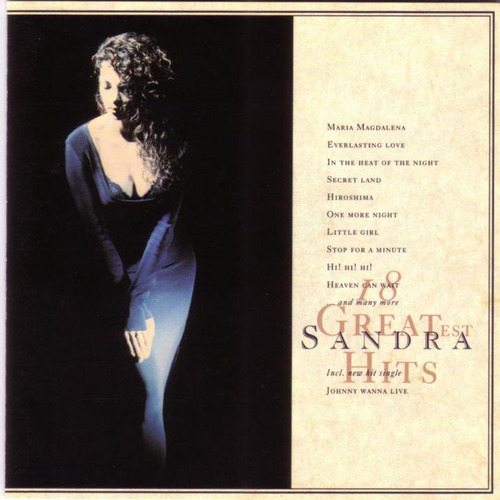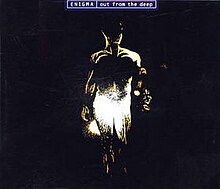
Sandra started the 90s with a a bang, releasing the first single from her new album. "Hiroshima" (a cover of a 1969 track by Wishful Thinking). It became a big hit, charting at #4 in Germany and received great reviews.

The album Painting In Yellow followed on March 26th. It reached the highest chart position to date for a Sandra album in Germany, peaking at #4. It hinted even more at a different musical direction for Sandra - in particular on the five-part album track
"The Journey", which foreshadowed the Enigma sound. Frank Peterson, who was the co-producer
(alias F. Gregorian) on the forthcoming Enigma project, took up the role of writing and
producing some of the tracks with Michael Cretu. His influence was clearly
audible.

The next single from the album was "(Life May Be) A Big Insanity", released in April. It only made it to #27 in Germany, becoming her lowest charting single up to that point. It marked the start of her decline on the singles charts in Germany. The song itself may have put audiences off, as it was a bit more funky then her fans were used to. It has to be said tough that unlike her previous album, there were not many great single choices on this one. I still think it is a good album and the song is fine in retrospect - but it is not hard to see why people may not have liked it too much at the time.

The final single from the album was a ballad called "One More Night". It came out in September and charted at #31 in Germany. Sandra ended the year with a performance of "(Life May
Be) A Big Insanity" at the World Music Awards in Monte Carlo where she
accepted the prize for Best Selling German Artist of the year. But the year was not over yet...
In December 1990, after eight months of preparation, Michael Cretu
released Enigma's debut album, MCMXC A.D. The album was a massive success - it received over 60
platinum-level sales awards worldwide, and topped the charts in 41
countries. By 1994 it had sold more then 14 million copies.

The first single, released just ahead of the album was "Sadeness (Part I)," which juxtaposed Gregorian chants and sexual
overtones over a dance beat. Cretu explained that the album was about unsolved crimes and
philosophical themes such as life after death, hence the name Enigma.
He had
previously used a Gregorian-type chant on the opening seconds of Sandra's 1987
single "Everlasting Love", without integrating them into other parts
of the song. "Sadeness" quickly rose to the top of the charts in
Germany and France; it went on to become a worldwide hit (including the UK and the US). Later Cretu would
claim that the now signature Enigma sound was inspired after falling asleep on
the London Underground.
Before the album was released, Cretu was cautious of the response towards the upcoming album, decided to forgo mentioning his and most of the personnel's real name and credited himself as Curly M.C., while the album sleeve contained little information about the background of the project, furthering the mystery about the creators of the album and leading to speculation whether Enigma was a band, a person or a group. It was in fact a project of five people, including himself, Sandra, Frank Peterson and two other people. Fans quickly realised that the main female voice belonged to Sandra and before long the identity of all the people involved the project was known.



Three more hit singles followed and by the time Sandra released her next studio album, Enigma was a massive worldwide success.

Sandra returned with the fabulous "Don't Be Aggressive" in January 1992. It was a darker sound then she had previously used and seemed to have more in common with the sound of Enigma then her previous solo songs. It is however one of her very best singles IMO. Backed with a fantastic music video, the song became a hit and charted at #17 in Germany

What followed was also one of her very best albums to date. Close To Seven continued a development towards a more meditative, less
dance-oriented musical style. Sandra wanted to move away from her previous sound into more adult music - and she did that very well on this album. There were several low key but very beautiful tracks on the album, including "When The Rain Doesn´t Come", ""Steady Me" (a promo single in Germany), "Mirrored In Your Eyes" and "Seal It Forever". The album sold well in her usual markets, peaking at #7 in Germany.

Considering how good the album was, why one of the least commercial songs was picked as the next single is a bit of a mystery. "I Need Love" was released in April. It failed to chart and became the last single from Close To Seven. I quite like it (and the video), but I think "No Taboo" would have been a much better choice for a single. The song would go on to appear again on her next album in a remixed version.

The next single from Sandra came quickly - she released "Johnny Wanna Live" in June 1992. The song originally was an album track her 1990 album Paintings in Yellow. It was remixed and released as a single to
promote her forthcoming greatest hits compilation album 18 Greatest Hits. The song,
co-written by Frank Peterson and later redone by his then-girlfriend Sarah
Brightman on her album Dive, was an anthem against cruelty to animals. The song didn't do well in the German charts, peaking at #37. However at this point it was starting to show that Sandra was becoming more of an album artist rather then singles artist.

18 Greatest Hits followed in October and reached the Top 10 in Germany, as well as other countries. It showcases her career up to that point very well, but it also marked the end of her most successful period. A VHS was also released with all the music videos and in 2003 the album was re-issued in Europe under the title Essential.


.jpg)
What followed was a quiet year for Sandra - the only solo release from her in 1993 was a remix single of "Maria Magdalena", with a (stunning) new video. She said she felt a bit bad that the song never got one back in 1985 so she wanted to make a brand new one.

Engima released The Cross Of Changes in December 1993. It became another huge success, spawning more hit singles (most notably the amazing "Age Of Loneliness (Carly's Song") which featured Sandra.




1994 would bring no new releases from either Sandra or Engima.
To be continued.


2 comments:
Sorry I have been a bit tardy in catching up with these fabulous retrospectives. I never realised Sandra was the vocalist on Enigma! Fab! Jx
And what a fabulous job she did! I'm sure that songs like "Sadeness", "Mea Culpa" and "The Age Of Innocence" would sound quite different without her.
I'm glad you are enjoying these posts. If you want to get more familiar with her music, I strongly recommend the Platinum Collection box set.
Post a Comment